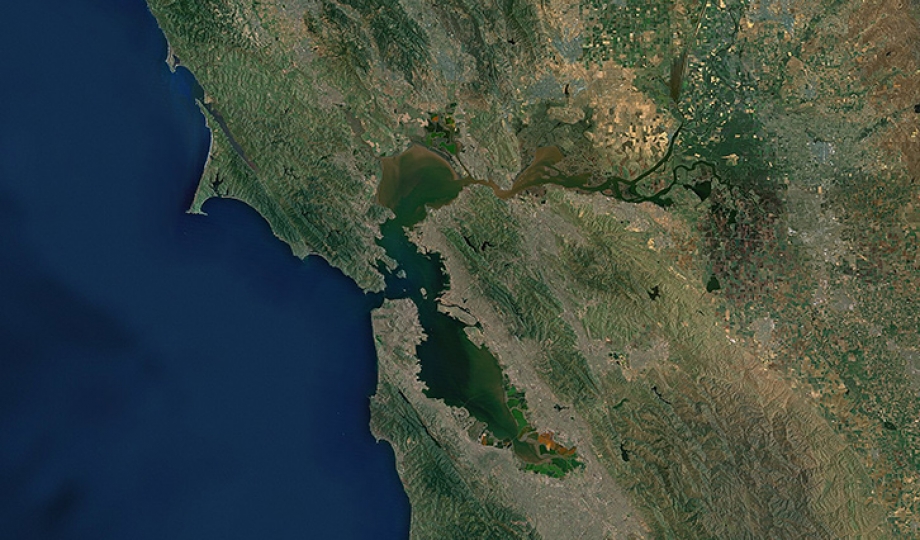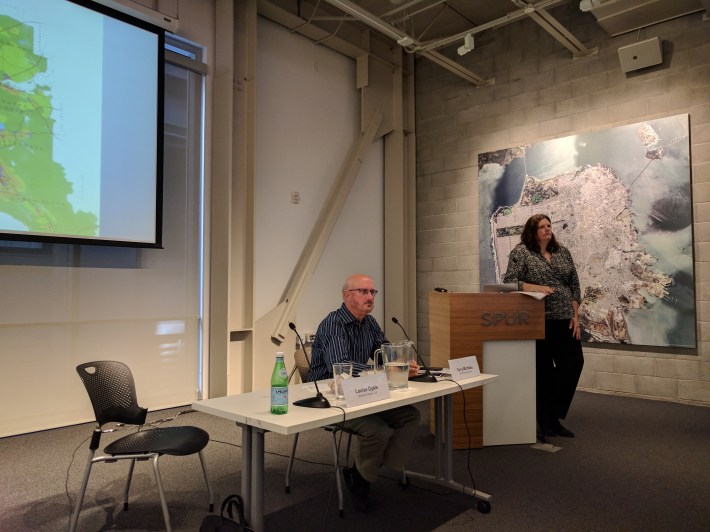SPUR Talk: Metropolitanism versus Local Control in the Bay Area
5:08 PM PDT on October 24, 2017

An image of the Bay Area, without parochial concerns. Photo: MTC
Since the United States declared its independence, there's been a fight about whether government should be centralized for efficiency, or things should be run from local townships and communities to maintain the closest connection between citizens and the people who govern them.
"In California, that division is reflected in our Constitution," explained Louise Dyble, an urban historian, during a presentation today at the San Francisco Bay Area Planning and Urban Research Association (SPUR). "It creates the home-rule doctrine, which gives charter cities a certain amount of independence," she said.
Section 11 of Article XI of the California Constitution: "Any county, city, town or township may make and enforce within its limits all such local, police, sanitary and other regulations as are not in conflict with general laws."
Independence and local control sounds good--politicians who are on a first-name basis with their constituents are more likely, at least in theory, to respond to their needs. But, of course, independence can also lead to parochialism, and disjointed, ineffectual policies when it comes to pollution, transit, and housing. So state legislators and advocates for regional control for decades have tried to "develop systems that transcend those cities."
This struggle is familiar to anyone invested in urban planning. Think of cities such as Brisbane, which refuse to build housing in the midst of a housing crisis, or San Mateo, which opted not to participate in Bay Area Rapid Transit a generation ago. But the struggle to figure out how to define and govern the Bay Area goes even further back. "What we understand to be the 'Metropolitan Area' was not a concept commonly understood until the late 19th early 20th century, explained Dyble.
Some problems are so big and fundamental, that there was never a way for a city or town to act alone--certainly, not when it came down to basic survival. "Our first agency to be created was the Metropolitan Water District of Southern California in 1928" which she said was the first time the concept of "metropolis" actually entered into a practical institution.
There were two schools of thoughts in government circles of California. The first, which was associated with political scientists at Berkeley, believed in looking at cities as regions--acknowledging that there was a social-economic unit emerging from the Bay Area that was beyond a collection of towns and neighborhoods. This movement was lead by Victor Jones, author of Metropolitan Government. At a time when most political scientists were concerned with international relations and federal institutions, Jones is credited with being one of the first to analyze local governance, according to his bio on the UC Berkeley website.
But this movement had to fight against those who cherished small towns and local control.
This all came to a head after WWII, when the Bay Area absorbed another million people. Throughout the 1950s, growth came in haphazardly, settling wherever they settled, explained Dyble. That lead to sprawl, water pollution and other big, regional problems.

No single township or neighborhood could do the heavy lifting of, for example, cleaning all the trash and pollution out of the Bay. So the push was on to get the region more, well, regional.
"In 1958, Pat Brown was elected governor. He was on board with the regional view," explained Dyble. "He wanted a regional agency that covered a broad array of issues, from law enforcement, to civil defense, to any other area with wide functions."
Thus began a long legislative fight to try and wrestle some control away from local governments, by creating a comprehensive agency to get regions working coherently.
But the legislative proposals to do so were "vociferously opposed by local governments, that denounced it as the 'monster agency'."
What survived, however, was a basic concept we know today: to form a sort of 'board of directors' representing local governments across a larger region.
"Basically, what we have now is the Association of Bay Area Governments" said Dyble, that were created to handle regional issues without "upsetting the powers that be" and as a way to appease those who were opposed to centralized power. We also got the "Bay Area Transportation" study, which eventually morphed into the familiar Metropolitan Transportation Commission (MTC), and a series of committees and Joint Power Authorities, up and down California, tasked with working on particular regional problems.
But from Dyble's perspective, the struggle to avoid centralizing power missed the point--there's still been a withering away of local democracy, mainly through racism, which excludes entire communities, and gerrymandering, which leaves us with legislative bodies that don't represent the politics of the electorate.
She also said that the local government boards, which are supposed to be the cornerstone of our decentralized state democracy, are aloof and disconnected. "I've been to way too many board meetings and people come to testify to the board on high--but those board members need to come down from their high chairs and sit at the table with the people," she said.

For more events like these, visit SPUR’s events page.
Read More:
Stay in touch
Sign up for our free newsletter



